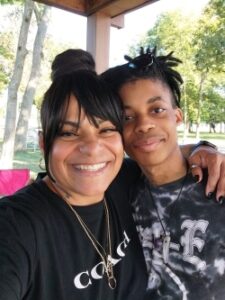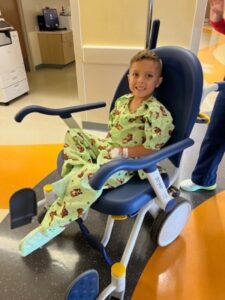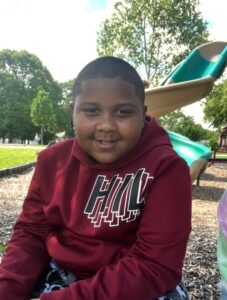Lucy Zerkle
little warrior: Lucy’s journey with very early onset-inflammatory bowel disease
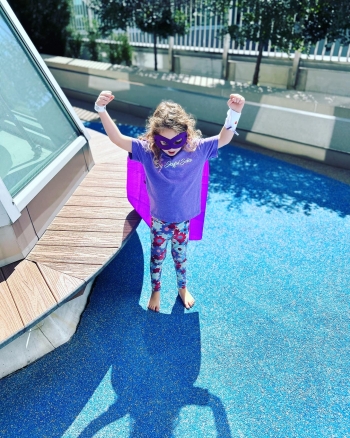
- patient name: Lucy Zerkle
- patient age: 6
- condition: ulcerative colitis, very early onset-inflammatory bowel disease
- seen in: gastroenterology
- providers: Shelly Rustagi, MD
Lucy first started showing symptoms in April 2023, with blood in her stool. Initially, it was a small amount but progressively got worse, leading her parents, Cassie and Luke, to take her to the emergency department.
Stool samples were taken as part of Lucy’s emergency department evaluation, and the test results revealed that she had a gastrointestinal virus. The care team advised her parents to let the virus run its course, but to follow up if her symptoms didn’t go away.
When Lucy’s symptoms didn’t go away, she was referred to the division of gastroenterology at Dayton Children’s Hospital. With a family history of inflammatory bowel disease (Luke has ulcerative colitis), Cassie and Luke were cautious but hopeful.
After her first gastroenterology appointment, Lucy was scheduled for a scope to check for inflammation in her esophagus, stomach, small intestine and colon (large intestine). Conveniently, her scope was planned at the same time as her tonsils and adenoids removal, allowing both procedures to be done simultaneously.
very early onset-inflammatory bowel disease: ulcerative colitis
On May 19, 2023, Lucy received a preliminary diagnosis of ulcerative colitis (UC), pending confirmation from a biopsy taken during the scope. UC is a type of inflammatory bowel disease that mostly affects the colon. In UC, the inflammation is continuous, without skipped areas, and it creates ulcers that can produce mucus or pus.
Pediatric gastroenterologist, Dr. Shelly Rustagi, explained to the family that if the biopsy results confirmed her suspicions, Lucy, being only 4.5 years old at the time, would also be diagnosed with very early onset-inflammatory bowel disease (VEO-IBD). VEO-IBD is a rarer form of IBD, affecting infants and children younger than 6 years of age. Children with VEO-IBD often don’t respond to traditional IBD treatments and require an individualized approach to care.
“we kind of knew this was a possibility based on Luke’s experience with ulcerative colitis,” said Cassie. “But as a parent, I was hoping her symptoms were just part of a nasty virus that would clear up over time.”

a treatment plan customized for Lucy
After receiving her official diagnosis of UC, Lucy had a four-hour appointment where she and her parents met her entire IBD care team. The length of new diagnosis appointments can vary from patient to patient depending on their unique needs. During this appointment, the different care team members introduced themselves and shared how they could provide the support Lucy needed. The family also worked with the team to develop Lucy’s individualized treatment plan.
At the time, Lucy wasn’t showing symptoms, so Cassie was hesitant to start her on medication. She expressed this concern to Dr. Rustagi and together they came up with a plan to start Lucy on nutrition therapy before trying anything else.
Nutrition therapy worked great for two months. But then, her symptoms returned full force, leading to four hospitalizations within a short period, including one during Christmas.
Following Lucy’s first hospitalization, she started biologic therapy to achieve and maintain remission, which means the goal is to have no inflammation. She visits Dayton Children’s every four weeks to receive an infusion. On average they spend six hours at the hospital when she needs an infusion, which is hard enough for an adult to sit through, let alone an active little girl! To date, Lucy has had more than 18 infusions.
“Dr. Jessica McCarthy, Lucy’s psychologist, helped create a poke plan that eases her anxiety about needles, and the Child Life team always keeps her entertained and distracted during infusions. Everyone goes above and beyond to make these long days more manageable.” – Cassie, Lucy’s mom
At Dayton Children’s infusions can vary in length from 90 minutes for those who are lower risk and have had their first three infusions to several hours, like Lucy’s, for high-risk and new infusions.
finding ways to make a difference
Luke felt frustrated watching his daughter go through similar struggles to his own. But instead of staying angry, Luke channeled his energy into action. He spent a lot of time researching organizations that could help, leading him to Take Steps, a Crohn’s & Colitis Foundation fundraising event. He joined the fundraising committee and in 2025, he and Lucy will be honored heroes at the Southwest Ohio Take Steps event.
While finding a mission that spoke to their family, they developed a great appreciation for support and community. Cassie and Luke have leaned heavily on their community and encourage other families to connect with support groups and research their options.
“as difficult as it might be, you’re not alone,” said Luke. “There are people who can relate, and the support we have received from the care team at Dayton Children’s has been invaluable.”
what mattered most to Lucy’s family
Looking back on their experience at Dayton Children’s, Cassie and Luke say Lucy’s team has shown a level of compassion that feels like the care between a parent and child. “They treat her as if she were their own,” Cassie shares. “You don’t find that kind of care at an adult hospital – there’s something truly special about having a children’s hospital so close to home.”
thriving with a bright future ahead
Despite everything, Lucy is thriving! She plays soccer, is excited to start gymnastics and loves school.
Ulcerative colitis is a lifelong condition, but by paying attention to her body’s signals and sticking to her treatment plan, Lucy and her family remain hopeful for a bright future.
inflammatory bowel disease care at Dayton Children’s
The Inflammatory Bowel Disease Center at Dayton Children’s provides comprehensive care for children of all ages diagnosed with Crohn’s disease, ulcerative colitis, and other complex forms of IBD, like VEO-IBD. Our team of pediatric specialists is experienced in managing even the most challenging cases, using the latest diagnostic tools and treatments to deliver personalized care plans. We tailor every treatment to meet the unique needs of each patient, ensuring the best possible outcomes. With a focus on both medical and emotional support, we empower families to navigate life with IBD and help children thrive.
If your child is showing signs of IBD, like Lucy, talk to your pediatrician or schedule an appointment with one of our specialists.
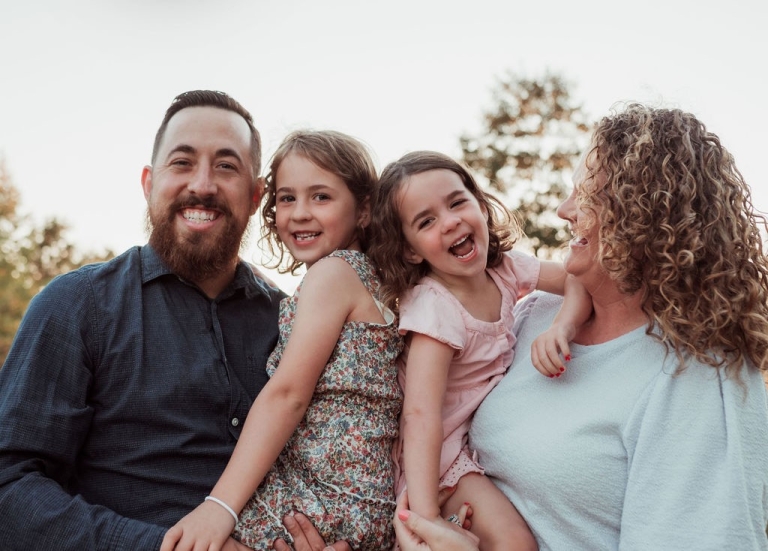
share your story
Every patient journey at Dayton Children’s is powerful — from NICU miracles to courageous cancer survivors and beyond. These patient stories not only celebrate our families but also offer hope and encouragement to others facing similar challenges. Share your experience today and help inspire, support, and celebrate the strength of our patients and families.
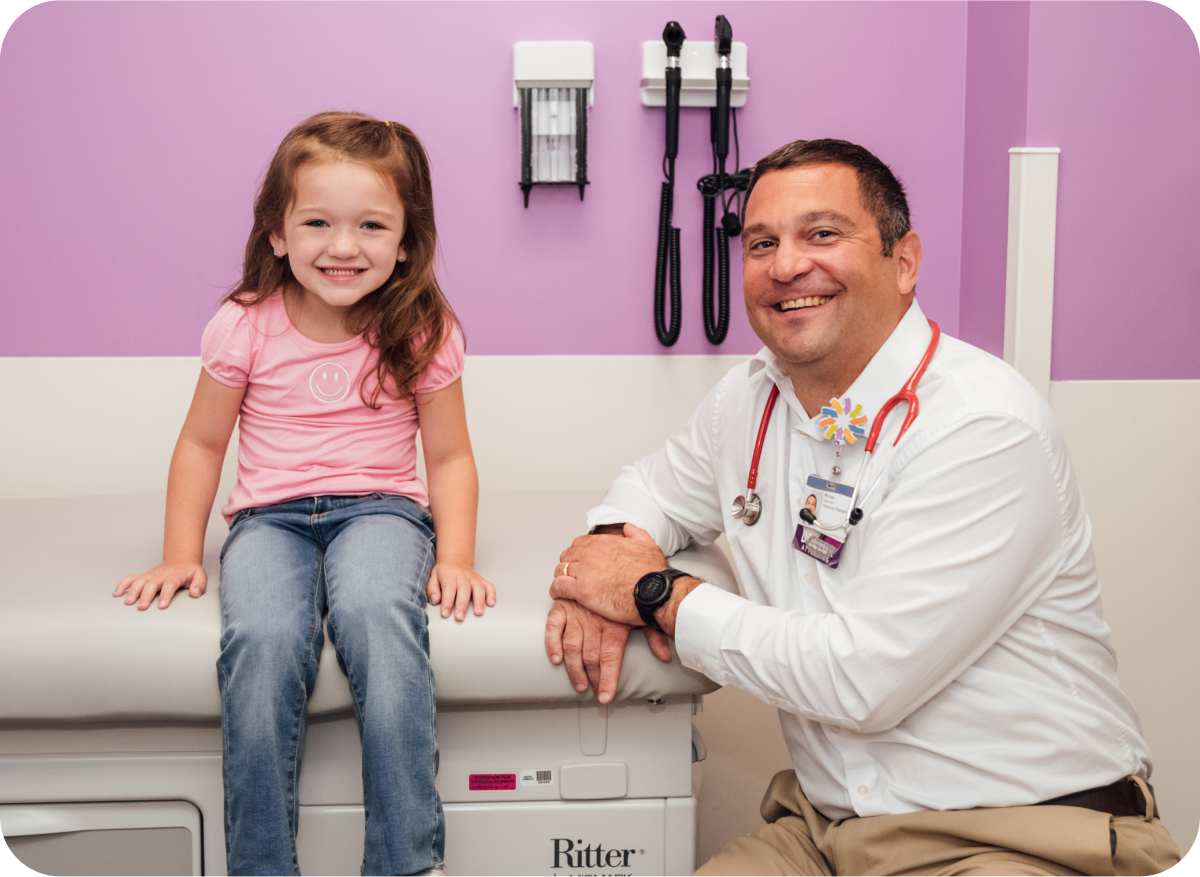
care that goes above and beyond
Because every child deserves care that goes above and beyond, Dayton Children’s provides compassionate, expert care for kids of all ages. Find a provider, schedule an appointment, or learn more about conditions we treat today.

